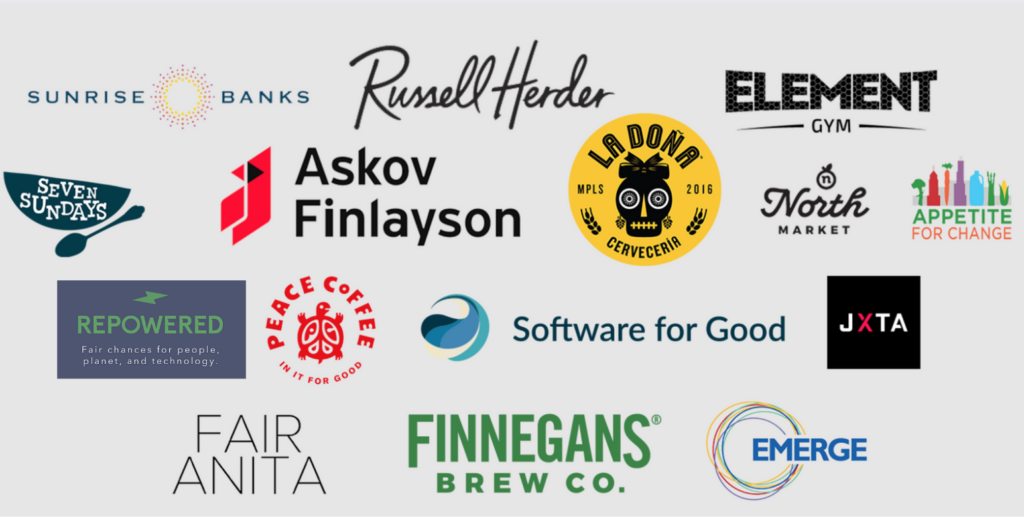SOCIAL ENTERPRISES ARE MAKING BUSINESS A TOOL FOR SOCIAL CHANGE.
WHAT IS A SOCIAL ENTERPRISE?

Any organization or company that sells products or services in order to solve an environmental or social problem.
These businesses, startups, or nonprofits have committed to integrating social impact as a legal component of their business model by declaring Public Benefit Corporation status, certifying as a B Corp, or adding earned revenue as a nonprofit.
Additionally, social businesses embedding social purpose frameworks such as social by sharing, selling, and sourcing/staffing into their core model are critical to this movement.
There are already thousands of organizations and companies that are leading by example

Why identify as a social enterprise?
For traditional businesses, social enterprise initiatives enable a company to integrate social impact into business operations and integrate intentional social goals alongside financial returns. Public declaration of these efforts through B Corp certification or Public Benefit Corporation status can institutionalize the social values and protect the company by including a company’s positive impact on the community, of equal importance to maximizing profit.
For traditional nonprofits, social enterprise can be a powerful complement to other activities when it advances the social mission, diversifying revenue generation away from reliance on grant dollars and providing financial independence of the organization.
For new organizations or start-ups, both nonprofits and for-profits — social enterprise gives entrepreneurs and leaders the ability to integrate social impact and financial stability into the core of the brand, protecting the values of the founder as the organization grows and develops.
What does the social in social enterprise mean?
What makes a social enterprise different from a traditional business or enterprise is its approach to seeking profits. The social aspect of the organization can be categorized in a few ways–by selling, sourcing, sharing, and/or staffing. Many organizations can be one or more of these components. Read more on the development of the definition of social enterprise here.
Organizations that make their impact through what they sell or to whom they sell it.
EXAMPLE: ASIYA
ASIYA® is a social enterprise modest activewear company, with a mission to encourage Muslim women of all ages to experience a new level of confidence, cultural integrity, comfort, and health. Through the selling of their innovative, sports hijabs — ASIYA products enable Muslim girls and women to be physically active and participate in sports while upholding their religious and cultural beliefs. With products designed by Muslim women for Muslim women, this apparel brand, additionally supports humane manufacturing processes with activewear Made in the U.S.A.
Organizations that develop their programs by how they make their products or services.
EXAMPLE: Repowered
Repowered is a social enterprise recycling service organization dedicated to providing marketable skills and employment to economically disadvantaged individuals while improving the environment through the repairing and selling of electronics and other e-waste.
Repowered, is the business division of Jobs Foundation, a nonprofit, providing job training and experience for adults facing barriers to employment that prepares them to be more valuable employees with an expanding future.
Organizations that exist to share some of all of their profits with charitable organizations or causes.
Example: FINNEGANS
FINNEGANS SBC is a social enterprise aimed at eliminating hunger and serving as a catalyst for social entrepreneurs. Through the sharing model, FINNEGANS beer company donates 100 percent of its profits to charity through a community fund that buys fresh produce from local farms and donates it to food shelves to be distributed.
The FINNEGANS Community Fund is a 501©3 dedicated to alleviating hunger in all markets where FINNEGANS products are sold.
Organizations that exist to employ people who have traditionally experienced barriers to mainstream employment.
Example: COOKIE CART
Cookie Cart is a nonprofit social enterprise providing teens 15 to 18 years old with lasting and meaningful work, life and leadership skills through experience and training in urban nonprofit bakeries. With two locations, in Minneapolis and St. Paul, the goals of this bakery is more than delivering delicious cookies, it’s developing relationships with youth at the center. The hands-on, job-training program, teaches essential employment skills to every teen who comes through the Cookie Cart kitchen
Social enterprises are vital to the achievement of the United Nations Sustainable Development Goals
As set by the United Nations, the Sustainable Development Goals outline 17 goals for solving the world’s most intractable challenges by 2030. Social enterprises offer financially self-sustaining models for positive social change and have an important role to play in achieving the SDGs. We believe social entrepreneurship is critical to the new era of collaborative leadership needed to enact this large scale systemic change.
Ready to Make a Sustainable, Global Impact?
Dozens of individuals and organizations play a critical role in advancing Minneapolis Saint Paul's impact ecosystem. Want to learn more about the opportunities and benefits of becoming a Leader? We'd love to start a conversation.
Change doesn’t happen in isolation. When passionate leaders come together, change can happen. Gather with the community of like-minded leaders at our next event or join our open digital community.
Meet the changemakers who are leading the way to a purpose-driven economy. Hear more about their journey, what drives their passions, and share a story of your own.
Want to learn more about the field? Explore our library of resources, take action pages, and the local network supporting social enterprise.
Do you and your organization align with purpose-driven values or the SDGs? Nominate your organization for the Impact Showcase, or reach out to us on how to become a social enterprise!
